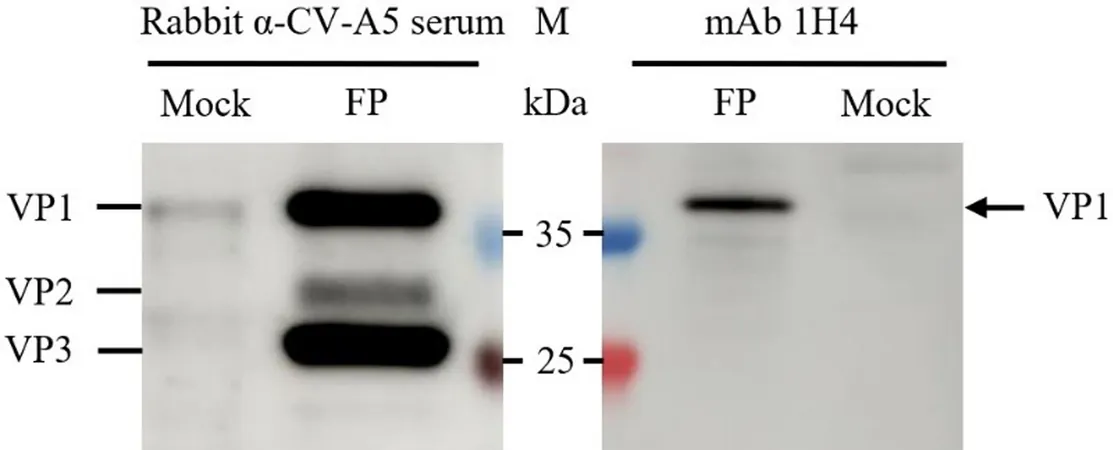
Breakthrough Monoclonal Antibody Discovered, Targeting a Key Epitope in Enterovirus A Linked to Hand, Foot, and Mouth Disease
2024-12-30
Author: Li
In an exciting advancement in infectious disease research, scientists have unveiled a broad-spectrum monoclonal antibody that recognizes a crucial linear epitope on the VP1 protein of the Enterovirus A species. This breakthrough has significant implications in the fight against Hand, Foot, and Mouth Disease (HFMD), a viral epidemic predominantly affecting children under five.
HFMD cases have surged, with over 90% attributed to Enterovirus A serotypes such as CV-A16, CV-A6, and the notorious EV-A71. While vaccines against EV-A71 exist, they lack cross-neutralizing capabilities against other serotypes, leaving a substantial gap in effective treatment for HFMD caused by CV-A16 and CV-A6. As a response, experts are urgently pushing for the development of multivalent vaccines and antiviral drugs to combat this ongoing health crisis.
Enteroviruses, which encompass a single-strand positive-sense RNA genome approximately 7,400 bases long, have structural proteins, with VP1 being a prime target due to its exposure and weak neutralization capabilities from existing vaccines. Recent studies, however, have shown that the new monoclonal antibody, named 1H4, binds to a conserved epitope specific to Enterovirus A, enhancing its potential as a diagnostic and research tool.
The study highlighted how the monoclonal antibody, while lacking neutralizing activity, can effectively identify Enterovirus A strains through immunoassays. The antibody's ideal binding region—a sequence within VP1—has shown to be highly conserved across various Enterovirus A serotypes, ensuring its utility in detecting multiple strains. This characteristic is pivotal as the continuous evolution of viruses complicates treatment options.
Existing antiviral drugs for HFMD remain in preclinical studies, highlighting the pressing need for effective therapies. Moreover, recent surveillance indicates a troubling rise in HFMD cases caused by non-EV-A71 serotypes, emphasizing the urgent necessity for broad-spectrum antibodies like 1H4.
The development process of the monoclonal antibody involved hybridomas derived from mice immunized with purified viral proteins, followed by rigorous screening processes to ensure specificity and affinity towards Enterovirus A. Importantly, this antibody could differentiate infections caused by Enterovirus A from those of Enterovirus B and C, providing a critical diagnostic tool.
The findings also raise hopes for future innovations in enterovirus diagnostics and vaccine development. As the research continues, the integration of broad-spectrum antibodies like 1H4 into clinical testing could revolutionize our approach to dealing with HFMD and other enteroviral infections.
In summary, the advancements brought forth by the discovery of the 1H4 monoclonal antibody represents a vital step toward tackling the escalating threat of HFMD, positioning researchers to enhance diagnostic methods and possibly contribute to the design of effective vaccines. As we continue our battle against these persistent viral adversaries, the potential applications of this antibody could lead to significant improvements in public health outcomes for at-risk populations.
Stay informed as researchers delve deeper, unlocking more secrets of enteroviruses and paving the way for future breakthroughs!

 Brasil (PT)
Brasil (PT)
 Canada (EN)
Canada (EN)
 Chile (ES)
Chile (ES)
 Česko (CS)
Česko (CS)
 대한민국 (KO)
대한민국 (KO)
 España (ES)
España (ES)
 France (FR)
France (FR)
 Hong Kong (EN)
Hong Kong (EN)
 Italia (IT)
Italia (IT)
 日本 (JA)
日本 (JA)
 Magyarország (HU)
Magyarország (HU)
 Norge (NO)
Norge (NO)
 Polska (PL)
Polska (PL)
 Schweiz (DE)
Schweiz (DE)
 Singapore (EN)
Singapore (EN)
 Sverige (SV)
Sverige (SV)
 Suomi (FI)
Suomi (FI)
 Türkiye (TR)
Türkiye (TR)
 الإمارات العربية المتحدة (AR)
الإمارات العربية المتحدة (AR)